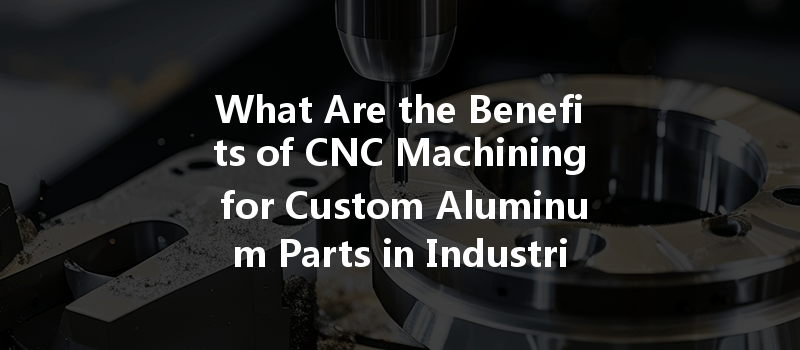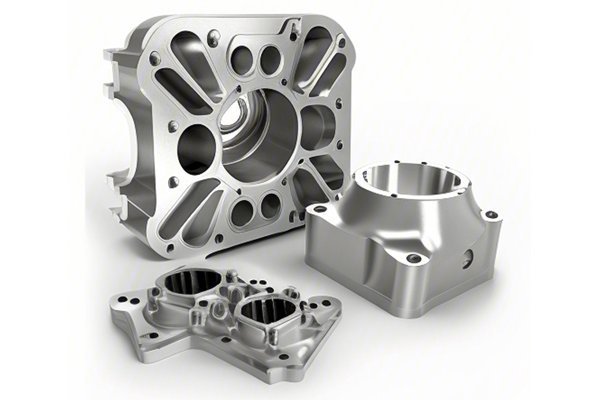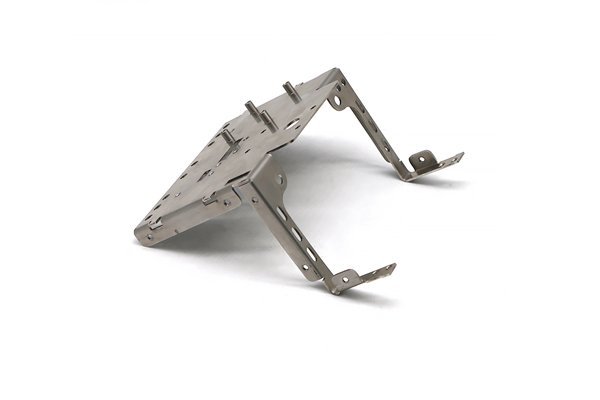Did you know that the global CNC machining market was valued at approximately $70 billion in 2021 and is projected to reach over $100 billion by 2028? This growth is not only indicative of the advanced technologies ushering the manufacturing sector into a new era but also highlights the increasingly vital role that CNC machining, particularly with materials such as aluminum, plays in industrial applications. As businesses strive for efficiency and precision, the demand for custom aluminum parts has never been higher. This blog discusses the myriad benefits of CNC machining for custom aluminum parts in industrial applications, providing detailed insights and solutions to the challenges posed in modern manufacturing.
Understanding CNC Machining
CNC (Computer Numerical Control) machining refers to the automated control of machining tools through a computer. This technology utilizes software to dictate the movement of machinery, allowing for a level of precision that cannot be matched by manual machining techniques. CNC machining encompasses a variety of processes, including milling, turning, drilling, and grinding, all of which can be applied to various materials, including aluminum.
Aluminum is a favored material in industrial applications due to its light weight, strength, and corrosion resistance. Its versatility allows it to be used in a multitude of sectors, including aerospace, automotive, and consumer electronics. The combination of aluminum’s inherent properties and the precision of CNC machining results in parts that meet rigorous specifications and performance requirements.
The Growing Importance of Custom Aluminum Parts
Custom aluminum parts are crucial for modern industrial applications. These parts are tailored to meet specific needs and requirements, allowing for improved functionality and integration into larger systems. Given the complexity of modern designs, off-the-shelf solutions often fall short. By investing in custom CNC machining services, businesses can ensure they receive components that align with their precise specifications.
Benefits of CNC Machining for Custom Aluminum Parts
One of the most significant advantages of CNC machining is its ability to produce highly precise and intricate components. CNC machines can execute cuts and engravings down to fractions of a millimeter. This level of precision ensures that parts fit together seamlessly, reducing the risk of errors during the assembly process and enhancing overall product reliability. For industries where safety and efficiency are paramount, such as aerospace and automotive, precision is non-negotiable.
Traditionally, manufacturing requires a considerable amount of time, labor, and resources. However, CNC machining has revolutionized this paradigm by automating numerous processes. With CNC machines, operations can run continuously, 24/7, leading to increased productivity. Additionally, since CNC machines can produce parts in high quantities with minimal human intervention, companies can meet large-scale production demands without compromising on quality.
Manufacturing complex geometries has historically posed significant challenges. CNC machining, however, can create parts with intricate designs that involve detailed cuts, curves, and contours. This capability is particularly important for custom aluminum parts that often require unique shapes or fit into complex assemblies. The advanced programming of CNC machines allows them to execute complex designs that would be prohibitively difficult or expensive to produce with traditional methods.
While aluminum is one of the most popular materials for CNC machining, these machines can also work with a wide range of other metals and materials. This versatility enables manufacturers to create components from different materials within the same production run, depending on the requirements of each specific part. Companies that invest in CNC machining for aluminum also benefit from the opportunity to scale up and diversify their manufacturing capabilities as needed.
Contrary to what one might think, investing in CNC machining can be cost-effective in the long run. Although the initial setup costs of CNC machines can be high, they often lead to savings by minimizing waste, optimizing machine time, and allowing for faster production turnaround. Moreover, customized parts can provide a better return on investment, as they can enhance product performance and reduce the need for additional modifications or adjustments later.
With CNC machining, the risk of human error is significantly diminished, resulting in consistent, high-quality products. Once a CNC program is written, identical components can be produced consistently without variation in quality. This standardization is especially important in industries where compliance with stringent regulations is required, as it ensures that each part meets the necessary criteria.
The ability to rapidly produce prototypes is another standout benefit of CNC machining. Manufacturers can create samples of custom aluminum parts quickly and efficiently, allowing for testing and evaluation before full-scale production. This agility shortens the product development cycle and helps businesses respond swiftly to market changes.
Manufacturing processes often result in material waste, whether through inefficient cutting techniques or the use of traditional manufacturing methods. CNC machining employs advanced technologies that optimize material utilization, producing parts from a single block of aluminum with minimal waste. This waste reduction not only lowers material costs but also reflects positively on a company’s environmental footprint.
Challenges in CNC Machining for Custom Aluminum Parts
While there are numerous advantages to CNC machining, it comes with challenges that must be addressed for optimal results.

Investing in CNC machines can be substantial. The cost of the machines themselves, along with the required software and skilled personnel, can be a barrier for small or medium-sized enterprises. However, companies should view this as a long-term investment, as the benefits will often outweigh the initial costs over time.
Operating CNC machines requires specialized skills, making it necessary to invest in training or hire skilled technicians. Companies must remain dedicated to ongoing training, as technology continues to evolve rapidly. Staying up-to-date with the latest advancements can help manufacturers take full advantage of the capabilities offered by modern CNC machining technology.
CNC machines require regular maintenance to ensure their longevity and optimal performance. Failing to follow a comprehensive maintenance schedule could lead to machine downtime, which can negatively impact manufacturing capabilities. Companies must allocate resources for maintenance and potential repairs to avoid disruptions.
Effective Solutions for Leveraging CNC Machining
In order to fully capitalize on the benefits of CNC machining for custom aluminum parts, businesses should consider implementing the following strategies:
When choosing CNC machines, invest in high-quality equipment from reputable manufacturers. Reliability, durability, and cutting-edge features will pay substantial dividends. Regularly assess and upgrade machines to ensure they meet the industry standards and the evolving demands of your operations.
Hire trained professionals who can operate CNC machines and interpret the data output accurately. Offering continued education opportunities helps retain skilled workers while ensuring your workforce can adeptly handle the demands of modern manufacturing.
Stay ahead of the curve by adopting innovative technologies such as CAD (Computer-Aided Design) and CAM (Computer-Aided Manufacturing). These tools aid in designing complex parts and generating accurate machine code, streamlining the CNC machining process. Consider exploring AI integration for improved efficiency and predictive maintenance.
Prioritize prototyping during the product development process. The capability to swiftly create prototypes with CNC machining can save significant time and costs. Use prototyping to gather feedback and make refinements before committing to mass production.
Evaluate and optimize workflows for efficiency. Automating various processes can lead to improved production timelines. Conduct regular assessments to identify areas of improvement and implement lean manufacturing principles to minimize waste and enhance productivity.
Integrate stringent quality control measures throughout the production process. Employ inspection tools and protocols to verify that components meet design specifications. Implement a feedback loop that allows for continuous improvement and adjustment based on performance data.
Partnering with reliable suppliers ensures access to high-quality aluminum and other materials for production. Engage in open communication regarding specifications and delivery timelines, fostering a strong partnership that contributes to overall success.
The advantages of CNC machining for custom aluminum parts are multifaceted, offering businesses improved precision, efficiency, and cost-effectiveness. As more industries shift toward higher standards for quality and reliability, choosing the right manufacturing process becomes crucial to maintain competitiveness. The challenges that accompany CNC machining can be addressed through informed decisions, skilled talent, and advanced technology.
By leveraging the benefits of CNC machining, enterprises can not only optimize their operations but also meet evolving market demands with confidence. As we advance in an increasingly technology-driven world, the ability to produce high-quality custom aluminum components will remain a cornerstone of successful manufacturing processes.
This blog not only highlights the benefits woven into CNC machining for custom aluminum parts but also emphasizes the importance of strategic planning and execution in today’s industrial landscape. For businesses aiming to thrive in a competitive environment, understanding and implementing CNC machining processes can be the key to unlocking innovation and operational excellence.
Remember, the importance of adopting modern engineering solutions cannot be overstated, especially as industries enter an era where adaptability and precision are paramount. Your journey toward CNC machining can be the turning point toward achieving continuous improvement and lasting success in the realm of custom aluminum parts manufacturing.






